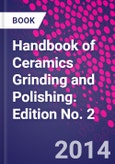Handbook of Ceramics Grinding and Polishing meets the growing need in manufacturing industries for a clear understanding of the latest techniques in ceramics processing. The properties of ceramics make them very useful as components-they withstand high temperatures and are durable, resistant to wear, chemical degradation, and light. In recent years the use of ceramics has been expanding, with applications in most industry sectors that use machined parts, especially where corrosion-resistance is required, and in high temperature environments.
However, they are challenging to produce and their use in high-precision manufacturing often requires adjustments to be made at the micro and nano scale. This book helps ceramics component producers to do cost-effective, highly precise machining. It provides a thorough grounding in the fundamentals of ceramics-their properties and characteristics-and of the abrasive processes used to manipulate their final shape as well as the test procedures vital for success.
The second edition has been updated throughout, with the latest developments in technologies, techniques, and materials. The practical nature of the book has also been enhanced; numerous case studies illustrating how manufacturing (machining) problems have been handled are complemented by a highly practical new chapter on the selection and efficient use of machine tools.
Please Note: This is an On Demand product, delivery may take up to 11 working days after payment has been received.
Table of Contents
1. Properties of Ceramics 2. Deformation and fracture of ceramic materials 3. Abrasive Processes 4. Fundamentals of Abrasive Machining 5. Grinding new author needed 6. Honing & Superfinishing 7. Lapping & finishing 8. Requirements for Machine Tools for Ceramics Machining 9. Manufacturing of Ceramic Components case studies








